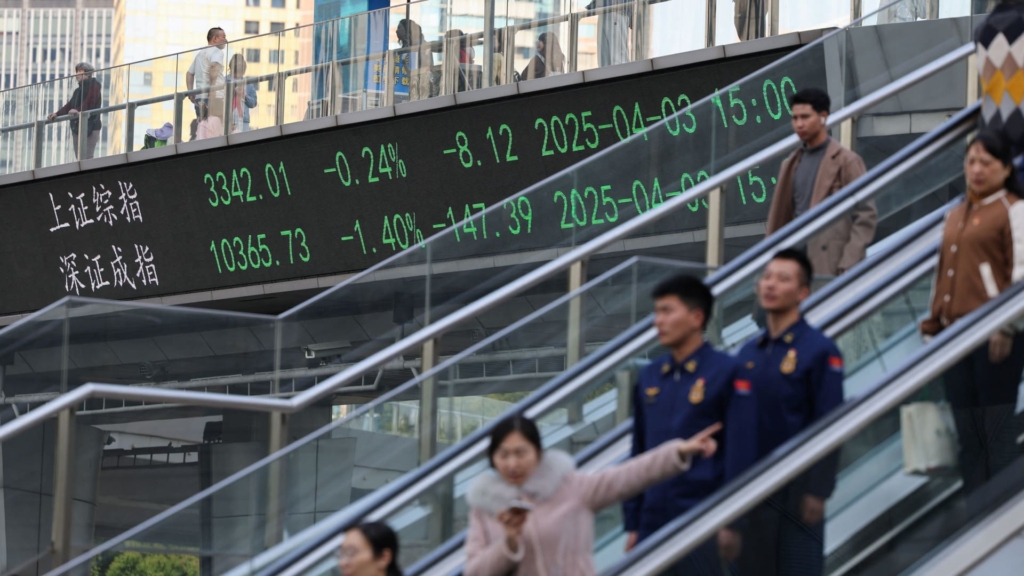Kai Wang, an Asia equity strategist at Morningstar, commented on the volatility, stating, “Many of the larger tech names and most consumer sectors have limited exposure to the U.S. market, despite some initial overreaction.” He suggested further fiscal policy measures may be on the horizon if there is any sign of additional economic weakness. Last month, China’s finance ministry indicated it remains prepared to act amidst both domestic and international uncertainties. A regular meeting of Chinese policymakers is scheduled for later this month.
An analysis from Citi’s China equity strategists revealed that technology stock valuations in China still remain attractive compared to their U.S. counterparts. The report noted that the average price-to-earnings ratio among seven leading Chinese tech stocks is currently 52% lower than that of America’s “Magnificent Seven,” falling short of the historical average of 33% over the past five years. The Citi strategists expressed a preference for domestic over export-oriented investments amid the challenges posed by rising tariffs, as well as favoring service-oriented sectors over goods.
Citi’s recommendations include prominent companies such as social media giant Tencent, electric vehicle manufacturer BYD, and appliance producer Haier, all of which are traded in Hong Kong.
Investor interest in Chinese technology has notably increased; according to Citi strategists, nearly a quarter of international investors have adopted a more favorable view of the sector, as indicated by the firm’s recent marketing efforts in the U.S. Furthermore, allocations to China within global emerging markets equity funds reached a 16-month peak in late March, as reported by EPFR.
Highlighting the innovation landscape, startup DeepSeek introduced an AI model in January, claiming it surpasses OpenAI’s ChatGPT, despite ongoing U.S. restrictions on advanced chip access for AI training. The adoption of AI technology is also anticipated to enable Chinese firms to reduce costs, coinciding with policies aimed at bolstering consumer growth.
In a report from HSBC analysts, initial upgrades to earnings projections for Chinese companies are primarily attributed to high-tech sectors and select consumer firms. An index tracking ten major Hong Kong-listed tech companies witnessed a 1.2% decline on Thursday, showing a resilience compared to the Hang Seng index’s 1.5% drop, while remaining over 20% up year-to-date—a stark contrast to the Hang Seng’s gains of just under 14%.
Another sector showing resilience to the new tariffs is the Chinese healthcare industry; pharmaceuticals were excluded from the latest tariff measures. Jefferies equity analyst Cui Cui and her team emphasized that most Chinese biotech firms are partnered with U.S. companies and do not engage in direct exports. They noted that any future tariffs on raw pharmaceutical materials could be passed down to U.S. pharmaceutical companies, alleviating some concerns for these enterprises.
Jefferies analysts also commented on the unlikely revival of focused legislative efforts, such as the expired Biosecure Act, which sought to restrict Chinese drug companies like Wuxi Biologics from federal contracts. They pointed out that both political parties in the U.S. support measures to lower drug prices, which necessitate maintaining an efficient operational structure for pharmaceutical firms. Wuxi Biologics stated in March that it anticipates “accelerated and profitable growth by 2025,” with Jefferies rating its stock as a buy.
Nevertheless, the full impact of the new U.S. tariffs on China’s economy remains uncertain. Morningstar’s Wang cautioned that while the tech sector may be somewhat insulated, tariffs are likely to have an indirect negative effect on China’s gross domestic product, potentially leading to increased market volatility.


























